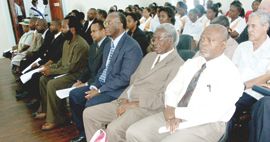CRC: Vincentians reject same sex marriages

Part 1
Matters of governance and human right issues such as same sex marriage and capital punishment were the subjects which “consumed” most of the time of the Constitutional Review Commission whose report was submitted last month.
The September 28 report also contained two innovations – the creation of a National Advisory Council of Elders (NACE) and including Independent Senators in the House of Assembly.
The commissioners said that they were mindful that in a constitutional review exercise of this nature, one had to be careful not to overwhelm the public with a “rash of radical innovations” but to remember that their work is about real people and their lives.{{more}}
“It is easy to become purely theoretical and to forget that one is dealing with real people who have real life experiences developed in a particular social, cultural, and political environment. We consider it prudent to propose innovations which are understandable to ordinary flesh and blood individuals living in the matrix of a State which has its own political history, political mores, political frustrations and political aspirations.
We believe that change should be fundamental and innovative, but that at the same time new institutions should be workable in the given context,” the Commissioners said in their report.
To this end, the commission has made recommendations in nine broad areas which, if accepted and implemented, would bring changes to the recognisable landscape of Parliament, the Judiciary, the public service, and fundamental rights and freedom – all towards an “alive constitutionalism” based on the two main pillars of a deepening of democracy and a reduction in the excessive powers of the Head of Government.
Areas of recommendation
The sections of the Constitution in which revisions have been proposed are: (1) Head of State; (2) Legislature; (3) Executive; (4) Finance; (5) Public Service; (6) Citizenship; (7) Judicial Provisions; and (8) Fundamental Rights and Freedoms.
Topping the list of recommendations is that St Vincent and the Grenadines should renounce the British Monarch as the Head of State and become a Republic appointing a President as the non-executive Head of State and a Vice-President. The National Assembly on the recommendation of NACE would elect both.
The National Assembly is recommended to remain a single chamber body but with 27 members. The number of constituencies is recommended to be increased from 15 to 17 and the other ten members would be nominated senators – five for the government, two for the opposition, and three independents representing Civil Society.
The Commission recommended that the terms “Opposition” and “Leader of the Opposition” be abolished and replaced by “Minority” and “Minority Leader”.
Sweeping changes were recommended for the Executive. Among them, no one should serve as prime minister for more than two terms; the number of Cabinet members should not constitute the majority in the House of Assembly; permanent secretaries should not be members of Cabinet; and, the office of the Attorney General should remain a public office.
No recommendations were made to change the current provision for citizenship but the Commission recommended that a regional or sub-regional Commission be established to harmonise the regional and sub-regional laws relating to citizenship.
Given that the nation’s judicial system is shared with other members of the OECS, major recommendations were not made except that the country should move quickly to join the Caribbean Court of Justice. It also recommended constitutional protection to the Magistracy and Family Court.
There were numerous issues raised under Fundamental Rights and Freedom with the most contentious being that of same sex marriage and capital punishment.
“The respondents have been overwhelmingly in favour of the retention of capital punishment, and virtually unanimous against the notion of same-sex marriages,” the Commissioners wrote and so was their recommendation.
The Commissioners declined to make a comment on a proposal for the use of marijuana for religious purposes saying they were not scientifically knowledgeable to make such a determination.
They maintained existing clauses relating to many rights and freedoms while recommending changes to some including the repeal of imprisonment for non-payment of debt; a review of imprisonment with hard labour; compensation for work done by prisoners while serving sentences; specific protection should be given to the right to collective bargaining by trade unions; and including eight more rights and freedoms. These are: (a) Right to equality of treatment; (b) Political rights; (c) Right to basic amenities; (d) Right to housing; (e) Freedom of culture; (f) Freedom of the press; and, (g) Right to protection as a witness.
The submission on September 28, 2006 brought to an end three years of review and consultation in which virtually no stone was left unturned as the Commission sought to consult as widely as humanly possible on how the country’s Constitution could be revised to achieve better governance. Consultations were held with every sector of society, in every political constituency and with the Diaspora in Britain, Canada, the United States of America, Trinidad and Tobago, Jamaica, Cuba, Barbados, and the British Virgin Islands.
This article highlighted some of the recommendations in most of the areas. In the coming weeks, SEARCHLIGHT will focus in detail on one area per week.









